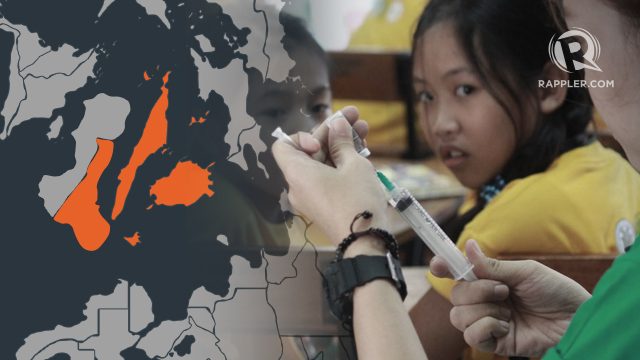SUMMARY
This is AI generated summarization, which may have errors. For context, always refer to the full article.

MANILA, Philippines – The Department of Health (DOH) will expand its school-based dengue immunization program to include public school students in Central Visayas.
This was revealed by health officials on Tuesday, October 4, during the plenary deliberations on the 2017 budget in the House of Representatives.
The DOH’s proposed budget was sponsored at the plenary by Masbate 3rd District Representative Scott Davies Lanete.
A couple of lawmakers on Tuesday asked the department if the vaccination will continue as scheduled this month.
Around 489,000 Grade 4 students (at least 9 years old) in Central Luzon, Calabarzon, and the National Capital Region are set to receive their second dose of the dengue vaccine from October to December 2016.
Lanete, who was in consultation with DOH officials during the plenary deliberations, said students in Central Visayas will also get their first dose of the vaccine this month.
“This dengue vaccine is relatively new to the market, so it has just passed Phase III clinical trials. And since it is undergoing pilot implementation in Regions III, IV-A, and NCR, it is now undergoing Phase 4 clinical trial,” he explained to Albay 1st District Representative Edcel Lagman.
Lanete continued: “The department has already also issued a resolution dated October 3, that since the seroprevalence of Region VII is more than 70% or way above the recommendation, it will expand the program to Region VII as well.”
“However since it’s still in clinical trial, it would be prudent for the department to study the program after 5 years, so in answer to your query, it will expand and continue program to pilot areas which the department has identified, however it holds itself after 5 years before implementing the program nationwide.”
Lanete told Lagman that the October 3 resolution has been signed by all members of the expert panel and approved by Health Secretary Paulyn Ubial.
Flip-flop?
Meanwhile, during his interpellation, Kabayan Representative Harry Roque Jr called out Ubial’s supposed “flip-flopping” on the school-based dengue immunization program.
“My apprehension is, this…resolution…came at a time when there was apparently a previous action on the part of the secretary of the Department of Health to discontinue this program. My concern is the apparent flip-flop of the secretary of health as far as the dengue program is concerned. Will [you] admit this program was suspended? And I believe the suspension was on July 20, 2016,” Roque said.
Lanete answered: “The department, as well as the secretary, assures it will continue the program most especially in pilot areas and review within the 5-year clinical trial phase for continuation of program within the entire nation.”
Roque than asked if reports are true that when the program was cancelled, P500-million worth of dengue vaccines were recalled form DOH health centers and brought to the department’s warehouses.
“The remaining vaccines are left within health centers and were not brought to a central facility within the DOH, but the department assures these are stored in appropriate containers and warehouses where they will last as long as their expiry,” Lanete said, adding that the vaccination initially targeted a population of 750,000 children.
He even enumerated a number of reasons why only around 489,000 students were immunized.
“One reason is they could be absent. Another reason is they could be sick, they have fever, flu. Another reason is they may be pregnant…Among others, these are part of reasons why there is a gap between the targeted population and the number of doses given, apart from that fact it was also administered during summer break, wherein many students were having graduation, absent, or some parents didn’t sign parental consent for these individuals.”
But on Tuesday, Roque repeatedly expressed his concern about the health department’s denial that the program was suspended.
“I understand the predicament of the sponsor. It was not he, after all, who caused the suspension of this program,” Roque said, referring to Lanete.
He continued: “But for the record, we have had committee deliberations on the budget of the DOH. It was no less than our deputy speaker from Cebu who brought the issue of the dengue vaccination, and it was very clear as the transcripts will in fact show that it was the position of the secretary of health that that dengue vaccination was suspended.”
“I am bewildered now why the same secretary of health is saying it was never suspended.”
Probe vaccine, lawmakers urged
Health advocates on Monday, October 3, appealed to lawmakers to continue investigating the safety and efficacy of the dengue vaccine.
“There is significant doubt in the scientific community about the safety of the dengue vaccine in question,” said Dr Antonio Dans, professor at the University of the Philippines College of Medicine and president of the Asia-Pacific Center for Evidence-Based Medicine.
“A trial that included Filipinos showed that the incidence of severe dengue increased up to 5 times more, 3 years after children were vaccinated,” he added.
Dans has been vocal against the department for pushing through with the program
“Evidence matters, but making hasty health policy decisions on incomplete data puts our children at risk. The fact is, the company, Sanofi, is marketing this drug despite doubts of safety. The continuing vaccine trial is the strongest evidence that the dengue immunization program is premature, and that even the company has some doubt,” he said in a statement.
Dengue, a disease common in tropical and sub-tropical countries, is transmitted through the bite of an Aedes mosquito. Dengue fever is potentially fatal and mainly affects children.
The Philippines is among countries in the Western Pacific region with the highest incidence of dengue in recent years. – Rappler.com
Add a comment
How does this make you feel?
There are no comments yet. Add your comment to start the conversation.